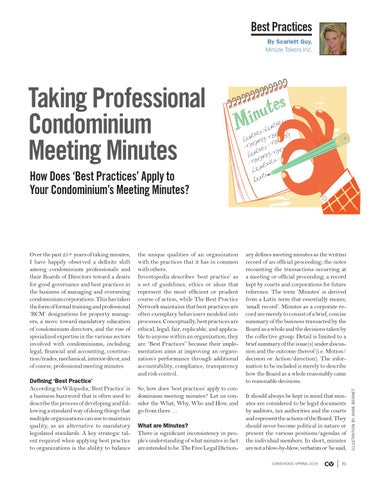Best Practices By Scarlett Guy, Minute Takers Inc.
Taking Professional Condominium Meeting Minutes How Does ‘Best Practices’ Apply to Your Condominium’s Meeting Minutes?
Defining ‘Best Practice’ According to Wikipedia, ‘Best Practice’ is a business buzzword that is often used to describe the process of developing and following a standard way of doing things that multiple organizations can use to maintain quality, as an alternative to mandatory legislated standards. A key strategic talent required when applying best practice to organizations is the ability to balance
the unique qualities of an organization with the practices that it has in common with others. Investopedia describes ‘best practice’ as a set of guidelines, ethics or ideas that represent the most efficient or prudent course of action, while The Best Practice Network maintains that best practices are often exemplary behaviours modeled into processes. Conceptually, best practices are ethical, legal, fair, replicable, and applicable to anyone within an organization; they are “Best Practices” because their implementation aims at improving an organization’s performance through additional accountability, compliance, transparency and risk control. So, how does ‘best practices’ apply to condominium meeting minutes? Let us consider the What, Why, Who and How, and go from there … What are Minutes? There is significant inconsistency in people’s understanding of what minutes in fact are intended to be. The Free Legal Diction-
ary defines meeting minutes as the written record of an official proceeding; the notes recounting the transactions occurring at a meeting or official proceeding; a record kept by courts and corporations for future reference. The term ‘Minutes’ is derived from a Latin term that essentially means, ‘small record’. Minutes as a corporate record are merely to consist of a brief, concise summary of the business transacted by the Board as a whole and the decisions taken by the collective group. Detail is limited to a brief summary of the issue(s) under discussion and the outcome thereof (i.e. Motion/ decision or Action/direction). The information to be included is merely to describe how the Board as a whole reasonably came to reasonable decisions. It should always be kept in mind that minutes are considered to be legal documents by auditors, tax authorities and the courts and represent the actions of the Board. They should never become political in nature or present the various positions/agendas of the individual members. In short, minutes are not a blow-by-blow, verbatim or ‘he said, CONDOVOICE SPRING 2016
CV
31
ILLUSTRATION BY JAMIE BENNET
Over the past 25+ years of taking minutes, I have happily observed a definite shift among condominium professionals and their Boards of Directors toward a desire for good governance and best practices in the business of managing and overseeing condominium corporations. This has taken the form of formal training and professional ‘RCM’ designations for property managers, a move toward mandatory education of condominium directors, and the rise of specialized expertise in the various sectors involved with condominiums, including legal, financial and accounting, construction/trades, mechanical, interior décor, and of course, professional meeting minutes.
